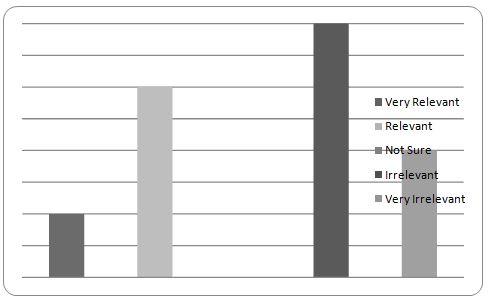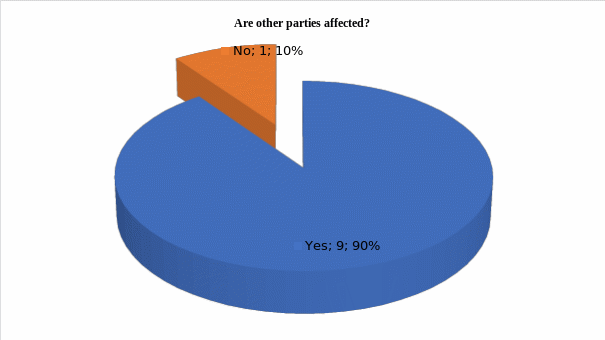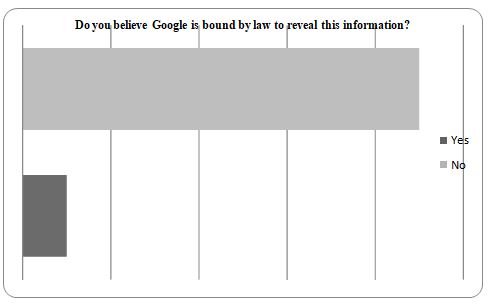Executive Summary
Google is the most successful search engine in the global market currently. The firm has been able to achieve success because of its unique search engine algorithm and other unique factors. However, the demand by the German government that it should reveal its search engine algorithm may have serious negative impacts on the firm that may affect its ability to stay at the top.
The revelation will expose the system to abuse from spammers and other cyber criminals who may want to use the search engine for their own benefits. It will also reduce the competitiveness of the firm in the market because its unique strategies will no longer offer it a competitive edge over its market rivals.
Introduction
The German government recently challenged Google to reveal its search engine algorithm as a way of enhancing transparency in its operations and protecting its clients from any form of bias. Germany, just as other countries around the world, have policies, which guide the manner, in which firms should operate in the market. One of the most important policies is the need to inform the consumer about the ingredients of the product they are consuming.
For instance, if it is a soft drink, there should be a label identifying all the ingredients that were used in its production. This helps in informing the consumers about the product they are consuming. This information will help the consumer to decide whether it is appropriate to use specific products.
It is on this background that the government of Germany has seen it necessary to demand that Google reveals its search engine algorithm so that its customers can know how it ranks its search results. According to Sterling (112), revealing such information may have profound negative effect on a firm’s competitiveness in the market. In this study, the researcher seeks to determine the impacts of revealing search engine algorithms on Google’s position in the search market.
Objectives and Methodology
According to Horvath (121), it is important to clearly define research objectives before starting a research project. The objectives act as a guide in helping the researcher get to the relevant data from the field, and conduct an analysis that would yield the desired conclusion. In this study, the researcher was interested in determining the possible impact of revealing Google’s search engine algorithms on its position in the search engine market. The following are the specific objectives of this study.
- To determine the relevance of revealing Google’s search engine algorithms
- To determine the negative consequences of revealing Google’s search engine algorithms.
- To determine if other parties face harm because this information has not been revealed
- To determine the justification on whether or not it is necessary to reveal this information
According to Winn (43), research methodology is a critical aspect of any study because it defines how the relevant data will be collected, analysed, and presented in order to be used by the relevant stakeholders. The researcher considered it necessary to interview a few people in the IT sector in order to determine their views on this issue.
The researcher also interviewed marketing consultants, especially those who have knowledge on consumer protection law to determine if Google is actually acting outside the law (Cook 54). The two categories of respondents will help bring a holistic understanding of the issue at hand. Their views can help justify the information available in the secondary sources of data such as newspapers, journals, or even books.
Findings
The researcher collected the primary data from a group of professionals in the fields of marketing and IT in order to determine their professional views on the issue. The following is a section of the questions that were posed to them. For each question, the researcher gathered responses from the respondents and recorded them appropriately.
What is the relevance of revealing Google’s search engine algorithms?
This was the first question in this research. The researcher was interested in determining how relevant it is for Google to reveal its search engine algorithm as per the request made by the government of Germany. The responses gathered from ten participants were analysed mathematically using excel spreadsheet, and the following data was obtained.

As evident in the graph above, majority of the respondents felt that this demand is not relevant given the market conditions. Majority stated that although this revelation comes with some benefits, the negative consequences are just too many to be ignored.
What are the specific negative consequences of revealing Google’s search engine algorithms?
This was the second question in this study, which sought to determine the specific negative consequences of revealing Google’s search engine algorithm as per the demand made by the German’s government. The following are some of the factors that were mentioned by the respondents.
- It will make Google’s search engine accessible to spammers. This will not only affect the firm itself, but also its users.
- It will not be possible to protect the intellectual property of Google in the global market, and this will expose it to an unfair abuse.
- It will defeat the effort that Google has put to come up with a unique algorithm that works in an incorruptible manner.
- Google may be forced out of the market unless it develops a new system that is not open to abuse.
Do we have a possibility that other parties face harm because this information has not been revealed?
This question was specifically meant to justify the reason why the government of German made the demand. According to Campbell (62), consumer protection laws seek to ensure that consumers are protected from unfair trade practices that only seek to benefit a business entity. The following chart shows the view of the respondents on this issue.

It is clear from the data above that an overwhelming majority felt that the current policy poses no harm to other parties unjustly. The respondents stated that the only people who may be affected by this policy are the spammers who only want to use the information for their own benefit.
The explanation given by this company that they use the popularity of a given website or an issue to rank the searches is enough. Revealing the actual technological aspects that are used may cause a serious harm to this firm, and may not benefit much those who are interested in using it positively.
Do you believe that Google is justifiably bound by law to reveal this information
This question was an extension of the third question above. The researcher wanted to determine if Google is justifiably bound by the law to reveal this information as per the demand of the German government. The graph below shows the view of the respondents.

Majority of the respondents felt that there was no justifiable reason that would compel Google to reveal this information as demanded for by the German government.
What advice will you give to the management of Google?
This fifth question focused on determining the opinion of the respondents on the best way it could approach this stalemate. Only one respondent stated that the firm should follow the instructions given by the German government.
Analysis
In this section, the researcher will use both primary and secondary data to develop an argument over the issue under investigation. According to Smith (45), the German government made a serious demand that Google should reveal its search engine algorithm or risk being forced out of the country. This was a serious demand that needs justification. According to Chaudhry (78), the government is always at liberty to stop a firm from its operations when it is determined that its products are of harm to the consumers.
The consumer law allows a firm to go to court when it feels that the government is acting in bad faith. According to the results obtained from the primary sources of data, it is clear that the current policy used by Google poses no harm to the users or its competitors (Marsh and Soulsby 67). The users of this search engine can get anything they want from this site as long as the information is available online. In every search, there will always be hundreds, thousands or even millions of results that is available.
However, these numerous results cannot all come at the top of the search engine. They must be ranked in an orderly manner. The more one becomes specific in his or her searches, the closer one gets to the most relevant sites. According to Bouchoux (45), a government is justified to issue demands when it is clear that there is a threat to the state, in case the threat is not directly posed to the consumers. This is not the case with the secrecy behind Google’s search engine algorithms.
According to Cseres (72), the current search engine market is increasingly getting competitive. Inasmuch as it is still dominated by Google, other companies are gaining grounds at a very rapid pace. Kaushal (53) says that the best way of staying ahead of strategy is to have hidden strategies that will make one’s products more appealing than that of its competitors. That is what Google has done in this market, making it the dominant search engine in the world.
When this secrete strategy is revealed, then Google will lose its competitiveness in the market. This will reduce its competitive advantage in the market. Although the German government claims that it needs Google search engine algorithm, spammers need it more because of the economic benefit they stand to gain. When these spammers understand how this algorithm works, they will manipulate it for their own interest, and the company may have limited ability to control such criminal activities (Devenney and Kenny 30).
This will not only affect the firm itself, but also its users. The people of this country will lose more than they stand to gain when this information is revealed. According to Griggs and Webb (35), 93% of the Germans rely on Google as their reliable search engine. When these spammers interfere with this system, this huge population will be affected negatively (Litman 45).
The research by Cartwright (118) states that Google has one of the best algorithms with a wide range of information. This success has been achieved through concerted effort by the management of this firm to do things differently in this industry. However, the respondents felt that this demand my defeat the effort that Google has put to come up with a unique algorithm that works in an incorruptible manner. Its unique operational strategies will become common approaches that can be applied by any other industry player.
Conclusion
The discussion above clearly demonstrates that revealing of Google’s search engine algorithm may have serious negative consequences on the firm. The study has proven that the German government has no valid reason to compel this firm to make this revelation. It has also confirmed that in case this information is revealed, this government has no capacity to protect the firm from the abuses that it may face in the market.
Spammers will be very happy to have the access to this information because it will allow them to control searches made through this engine. This will have negative impacts on the users. They may be forced to consider using alternative searches, the fact that may drive Google out of its current glorious position as the market leader in this industry.
Recommendations
The following are some of the recommendations that this firm should observe to avert such consequences
- Google should resist any form of pressure by the German government, or any other agency, to reveal its search engine algorithm.
- Google should directly engage the government or any other relevant agency in a dialogue so that the firm can respond to any questions or address any fear about its products.
- The firm should continue inventing new strategies that can back up its current system just in case the information is revealed.
Works Cited
Bouchoux, Deborah E. Protecting Your Company’s Intellectual Property: A Practical Guide to Trademarks, Copyrights, Patents and Trade Secrets. New York: AMACOM, 2001. Print.
Campbell, Dennis. International Consumer Protection. Huntington: Juris Pub, 2011. Print.
Cartwright, Peter. Consumer Protection and the Criminal Law: Law, Theory, and Policy in the Uk. Cambridge: Cambridge University Press, 2001. Print.
Chaudhry, Peggy. Protecting Your Intellectual Property Rights: Understanding the Role of Management, Governments, Consumers and Pirates. New York: Springer, 2013. Print.
Cook, James 2014, Germany Just Asked Google to Do the Impossible: Reveal Its Secret Search Algorithm. Web.
Cseres, Katalin. Competition Law and Consumer Protection. The Hague: Kluwer Law Internat, 2005. Print.
Devenney, James, and Mel Kenny. European Consumer Protection: Theory and Practice. Cambridge: Cambridge University Press, 2013. Print.
Griggs, Lynden, and Eileen Webb. Consumer Protection Law. South Melbourne: Oxford University Press, 2013. Print.
Horvath, John. Consumer Protection Law Developments. Chicago: ABA Section of Antitrust Law, 2009. Print.
Kaushal, Anoop. Universal’s Practical Guide to Consumer Protection Law. Delhi: Universal Law Pub. Co, 2006. Print.
Litman, Jessica. Digital Copyright. Amherst: Prometheus Books, 2006. Print.
Marsh, Samson and John Soulsby. Business law. Nelson Cheltenham: Thornes, 2002. Print.
Smith, David 2014, Why Google Shouldn’t Reveal Its Search Algorithm. Web.
Sterling, Greg 2014, German Official: Google Should Reveal Its Ranking Algorithm. Web.
Winn, Jane. Consumer Protection in the Age of the ‘information Economy’. Aldershot: Ashgate, 2006. Print.